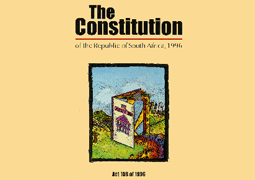
Parliament, Wednesday, 8 May 2024 – The 28th anniversary of the adoption of South Africa’s Constitution presents all South Africans with yet another opportunity to reaffirm our commitment to promoting unity in diversity and to strengthen the culture of respect for human rights and the rule of law within the context of our maturing constitutional democracy, the Presiding Officers of Parliament, led by National Assembly Acting Speaker, Mr Lechesa Tsenoli, and Chairperson of the National Council of Provinces, Mr Amos Masondo, said today.
Adopted by the National Assembly on 8 May 1996 and signed into law by former President Nelson Mandela on 10 December 1996, the final Constitution marked a decisive turn from a long history of colonisation, racially motivated segregation, and apartheid.
President Cyril Ramaphosa, who chaired the Constitutional Assembly in charge of negotiating the Constitution, in his speech 28 years ago, called this supreme law of the land the new South Africa’s birth certificate.
Since the advent of democracy, the country has recorded many gains which have dramatically improved the lives of South Africans.
Guided by the Constitution, as a nation we established institutions such as Parliament and Chapter 9 institutions to ensure that those in power are accountable to the people. The Constitution also created a basis for new state machinery, including the defence force, the police, the judiciary, and the civil service.
As the cradle of the Constitution, Parliament is seized with ensuring that the Constitution safeguards and protects the rights of all South Africans, particularly the marginalised. The Constitution enjoins Parliament to represent and protect the rights and aspirations of our people by passing progressive laws and creating a platform for debate on matters that concern citizens. Parliament fulfils this role by keeping the executive and state institutions accountable and creating space for public participation in its law-making and other processes, including amending the Constitution when the need arises.
Since its adoption, Parliament has passed eighteen amendments to the Constitution, guaranteeing basic freedoms and rights for all citizens, including freedom of expression, association, and equality. As early as 29 August 1997, the first amendment was gazetted. The Constitution of the Republic of South Africa Amendment Act of 1997 amended the Constitution to provide for changes to the oath of office of the Acting President and to extend the cut-off date in respect of the granting of amnesty.
As testament to the robustness of our democracy, several amendments were made to the Constitution over the years, with the most recent being the Constitution Eighteenth Amendment Act of 2023, which sought to recognise South African Sign Language as one of the official languages of the Republic.
The Presiding Officers affirmed that these Constitutional amendments are aimed not only at removing and addressing the persistent racial and class discrimination related to the apartheid legacy but also discrimination based on sex, gender, sexual orientation, and culture. Our Constitution forms the foundation of a national democratic state which has entrenched popular representative institutions of government based on one person, one vote without regard to race, sex, property, and other discriminatory qualifications. It is the blueprint for all South Africans who are committed and loyal to the principles of democracy and non-discrimination.
In its quest to safeguard the rights of the marginalised in society, Parliament has also passed progressive laws such as the Promotion of Equality and Prevention of Unfair Discrimination Act, the Consumer Protection Act of 2000, the Domestic Violence Act of 1998, the Criminal Law (Sexual Offences and Related Matters) Amendment Act of 2007, and the Traditional and Khoisan Leadership Act of 2019. Another significant law that entrenched the right to sexual orientation and passed by Parliament in 2006 recognised same-gender marriages – making it the first country on the African continent to legalise same-gender marriages.
In 2004, Parliament passed two pieces of legislation that proved to be significant milestones in efforts to redress the social ills of our apartheid past. The Social Assistance Act of 2004 and the South African Social Security Agency (SASSA) Act of 2004 provided a social assistance safety net through social grants payouts to millions of poor and marginalised South Africans. Today, almost 19 million South Africans benefit from social assistance.
Today, in the 28th year since the adoption of our Constitution, may we be reminded that over the years, with our progressive and transformative Constitution, South Africa has established itself as a leader in safeguarding and promoting social justice and human rights – especially women's rights and the rights of the poor and vulnerable.
May we continue to embrace our internationally acclaimed Constitution and ensure that its provisions translate into equality in all respects, freedom in its entirety, and prosperity for all who live in this land.
On 29 May, South Africans will have another opportunity to exercise their constitutionally enshrined right to elect representatives who embody their hopes and aspirations in both Parliament and government. Parliament calls on all registered voters to exercise their hard-won right to vote and to ensure that this right is not violated in any shape or form.
ISSUED BY THE PARLIAMENT OF THE REPUBLIC OF SOUTH AFRICA

